Parsing the interface text on a booking - how did I audit it
When I was turned 180 degrees at the airport before flying to Greece, I started calling the ticket and hotel services. AWAD, in fact, put on me as a client - “look at the site”, “enter your personal account” and so on. On the other hand, Bucking listened attentively, dialed the hotel live and clearly rescheduled my reservation while I went to the express train. Although the hotel rules if something is wrong - the guest goes to hell. So I appreciated the difference in service.
But I'm not talking about that. The fact is that Bucking offered me a contract to verify the adequacy of the translation of their site into Russian. I’ll show you right away how it started:
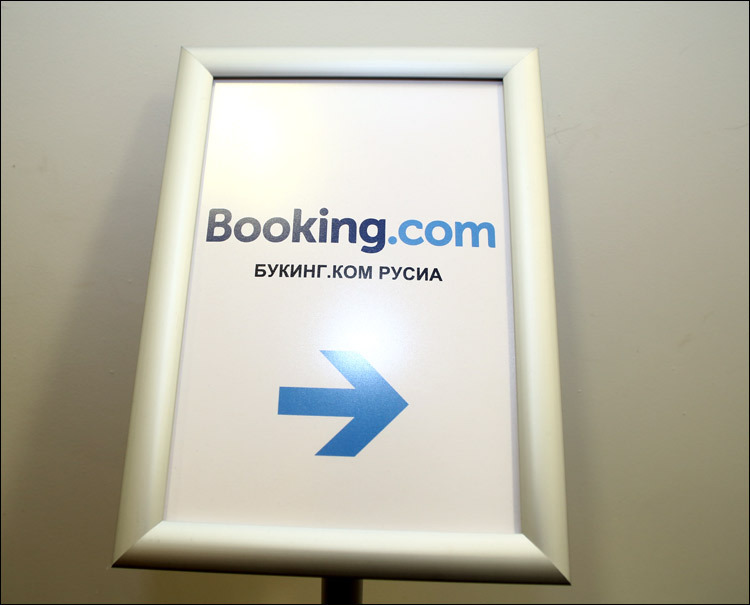
But what’s going on:

And now I’ll tell and show what and how with the interface texts.
The head of the Russian translation team, Polina Rybakova, contacted me and asked if I would like to dig their site for 5 days as an expert invited to the office. I did not have 5 days, and without thinking twice, I refused. Although, of course, I really wanted to work with these comrades, because there is something to learn. A week later, Polina contacted again and said that it could be shorter, the main thing is the result.
Then, the older Shi team from Shanghai called me and asked why I did not have a CV and LinkedIn profile. All applicants have, but I do not. The phrase about “I somehow do not need it, and then, I already refused you”, seems to have torn her template. As a result, we talked for about twenty minutes about the features of localization and a simple language. Shea requested various links to my publications, thought and signed a contract.
As a result, it was necessary to look through all the translations of the site and say:
But enough lyrics. Go.
Right on the main thing, this was striking:

The root of the issue in marketing. English has a beautiful word for any type of accommodation. It is needed because Bucking has not only hotels, but also all sorts of houses, and in general a lot of things. Including - rafts with apartments for rent. So, they categorically did not want to write “hotels” in this place, because the client must understand that everything can be booked in a row.
This is a classic fight marketing and interface. The phrase represents the entire site. And it was written so that nothing is deposited in the head. Plus, on the site, it is deep under the search form, which lists all the options. Both of these arguments compelled me to give advice after all to write “for hotel searches”. The principle is this:clear but incomplete information is better than completely incomprehensible and complete.
Now let's look at the big interface element of the main page - the search form. In the search - the power and might ofMordor Bucking.
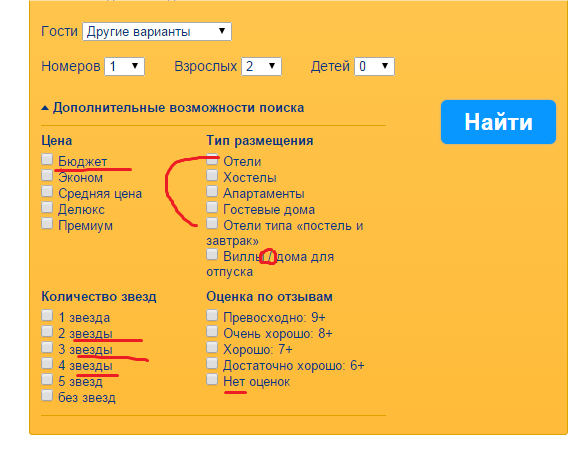
There are two important issues here:
Then another magic thing turned out. It turns out that variables (for example, city names) are stored without a genus. When they are substituted for buttons and other elements, you have to dodge, which gives rise to such monstrous constructions:

Here, by the way, there is another problem - two superlatives
Well or here:
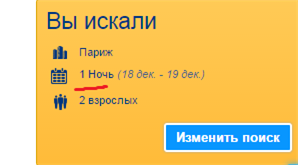

Just change?Not really. Firstly, as with all normal client-oriented companies, no attempt to get in touch with a client is left without the warm breath of the central office. This is very correct, which is proved, for example, by the same Starbucks with an amazing school for training sellers and similar companies. A counterexample - it is worth letting it go by itself, and now the Russian branch of one automobile concern rivets an advertisement about sex (which is banned when it comes to the European director what happens); we have guys on the ground craving SMS with dubious text on the customer base and so on. In general - trash, waste and hell are possible.
It is clear that a company may receive something because of the inflexibility of such a policy when a person on the spot is smart and understanding. But in 40 countries, it’s easier to do everything from one place, and not to watch the self-expression of managers with interest. Here it means that all translations of important things marketing wants to see without distortion. Which, incidentally, is very sensible, again - in their place, I myself would have established such a rule. It was assumed that I would check from the side whether everything was accurately translated. In practice, it turned out that I convinced them that it was possible and necessary to step back a bit from mirror broadcasting.
Secondly, there is still complexity. As you can see from the cases, the translation does not end with those who write texts, and those who translate them into different languages. Need more developer, which will take into account the language features. In our case, there are long buttons, long fields of forms, declensions, kind of words, date format (December, 10) and much more. But such a task has so far arisen only in Russia. Translators said that only German is longer than Russian - but everything is simple there. The Germans quite calmly perceive English words in written speech and interfaces. As a result, developers may someday have to learn to persuade unfamiliar cities. And, most likely, with the help of Yandex language tools. By the way, for comparison: the same Facebook still can not cases - in my account flaunts "Lives in Moscow." Or, MS also missed a bit with texts for buttons and forms (see review):

I will just attach a few small pieces from the report to show what problems might be.
Here, the euro jumped to 80 rubles and went down to 70. This advantage has become very important:

Here you need more specifics. And at the same time - to hell with all the variables ("we speak your language" - well, let's call it!)
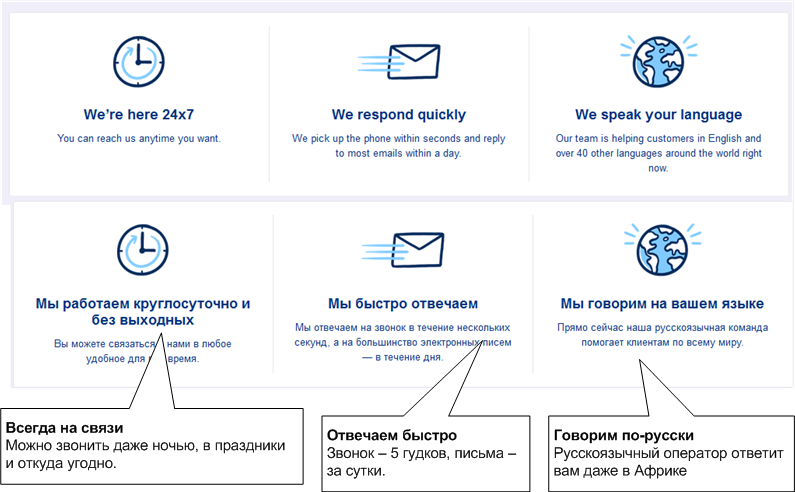
And again:
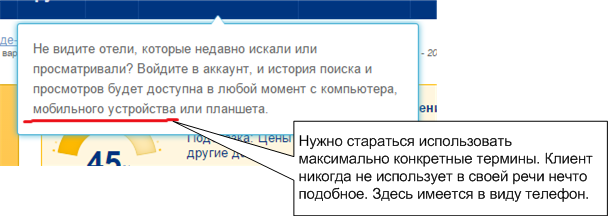
In the end, I suggested replacing the "account" with "your profile" or "your personal account" - the site uses a lot people far from IT, so you need to make life easier for them without scaring them with unfamiliar words.
And here, let me introduce, perhaps, the most important interface problem:

The fact is that the address is written in part in the original language (where the non-translated toponyms are), and partially in Russian (where the toponyms are translated). I tried twice to show the address to the taxi driver in the country with the hotel. He muttered into the Cyrillic alphabet and called the number from a piece of paper. Once again, I copied German addresses to Google maps to understand where the hotel is located - and smart Google got two very similar names on address translation to normal form. As a result, I almost stopped 70 kilometers east of what I wanted.
Recommendation - two addresses; one in the local language and one in Russian.
Here is another interface problem. The site has lists of hotels that act as favorites or bookmarks.
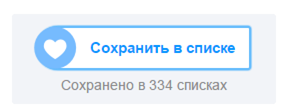
What is a “list” is completely incomprehensible. And these are the "favorites." If this is not possible, then you need to add the possessive “save to my list” or change the description of the process “add to the list”, “save these options in the list” to the description of the result like “remember the hotel”.
Various revealing trifles:
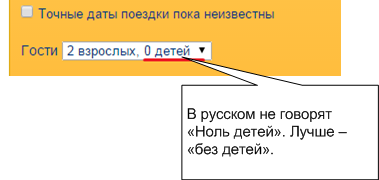
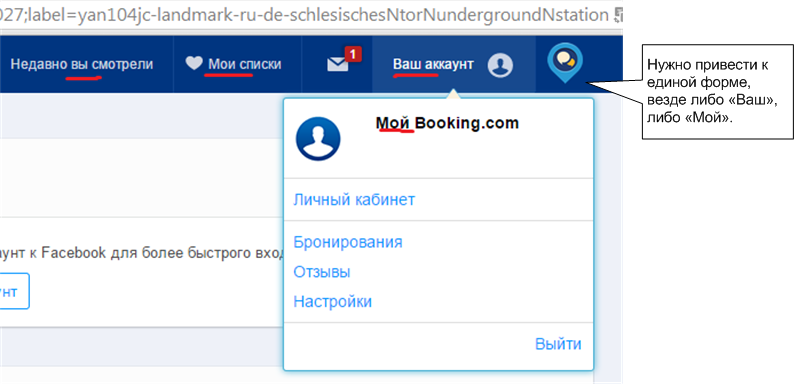
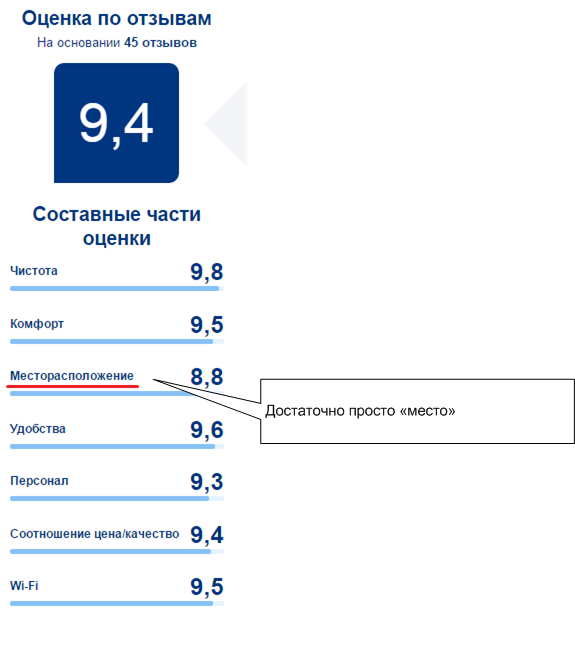
Booking produces cool city guides, which are written in a language much less official than on the site. If you even insert the word “residents” into this phrase, there will be what the English compiler wanted to say.
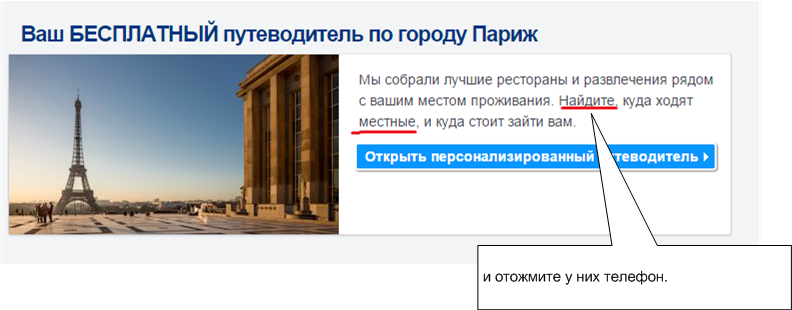
Here is the problem that the same variable can be taken from different places:
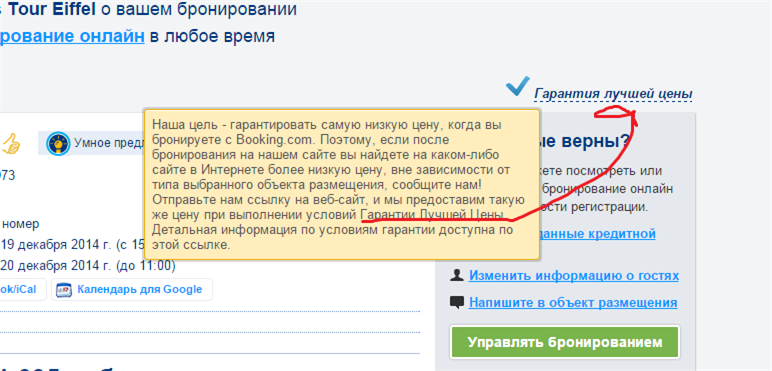
And here is the classic:

Here, apparently, in the localization there was something like% compare_caption%; on hover -% compare_description%. I suspect that the second tag for output was made copy-paste from the first, and we have two% compare_caption%. By the way, I think that in Russian it’s better not to “compare”, but “add to comparison” - they will run AB tests to get evidence.
Let's move on:
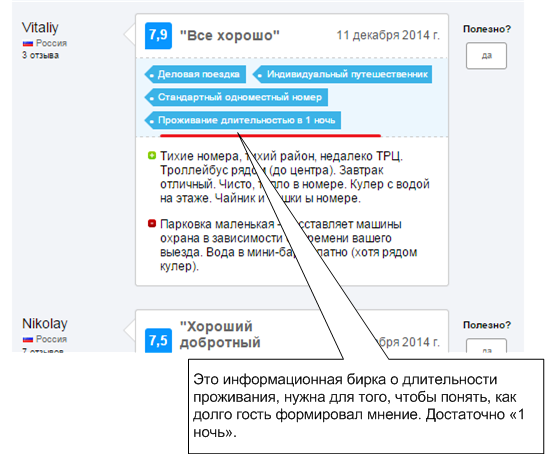

Here it’s very touching for the user to learn to click on the checkboxes. If you have to explain how the interface works in a tooltip, it means that the interface itself needs to be changed, not the text for it:
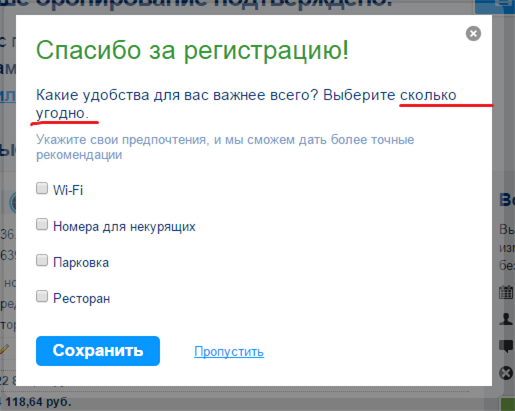
There are funny moments because of 12 times in English:
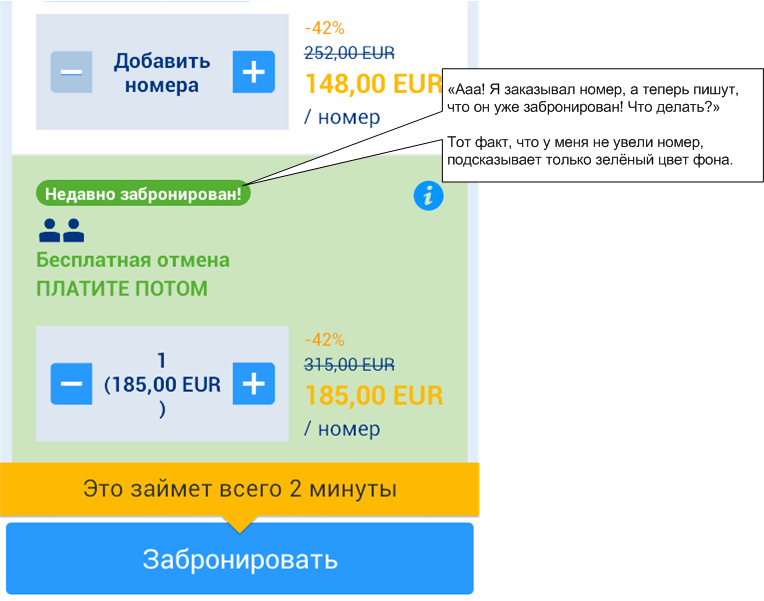
Here is a bit of localization: in enlightened Europe they don’t know about inter-regional roaming:
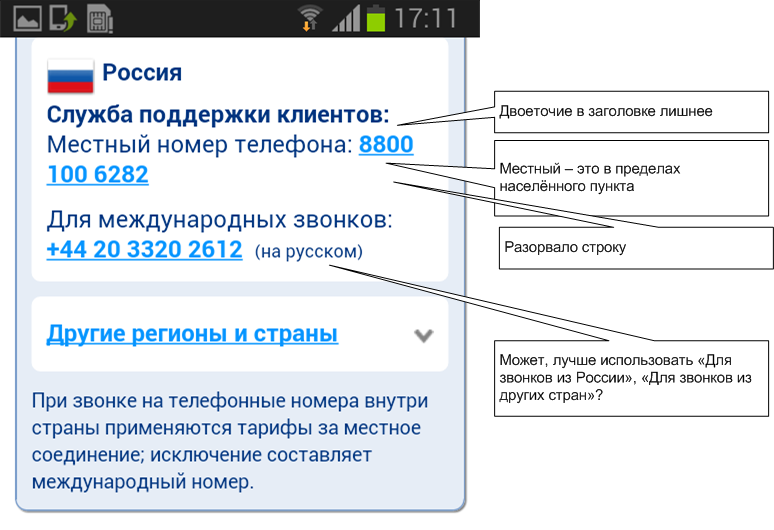
When the edits accumulated under a hundred, and some sort of systematics appeared, it was necessary to discuss all this with the rest of the translation team. And she, a surprise, is sitting in Amsterdam. Well, we picked it up and called: I first appreciated why videoconferencing is better than regular instant messengers, it was really useful. In general, the office has a very well-thought-out infrastructure, we must take it for ourselves to the future. Here, see, for example, a standard hatch in the floor:

“Spine” with wires:

All employees have the same laptops, and on all desks (including in the meeting rooms) the same docking stations:

I brought the laptop to the workplace, stuck it in the dock - I got a picture on the big screen and keyboard. He pulled it out with a crunch, went into the meeting room, stuck in the dock ...

A good indication of the busyness of the meeting rooms :

Some kind of Norwegian-German order, all the cabinets in the kitchen are neatly signed:
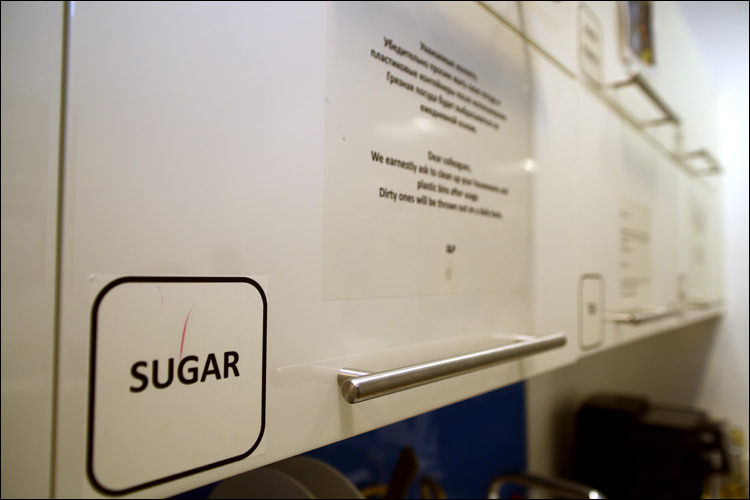
And our games are:
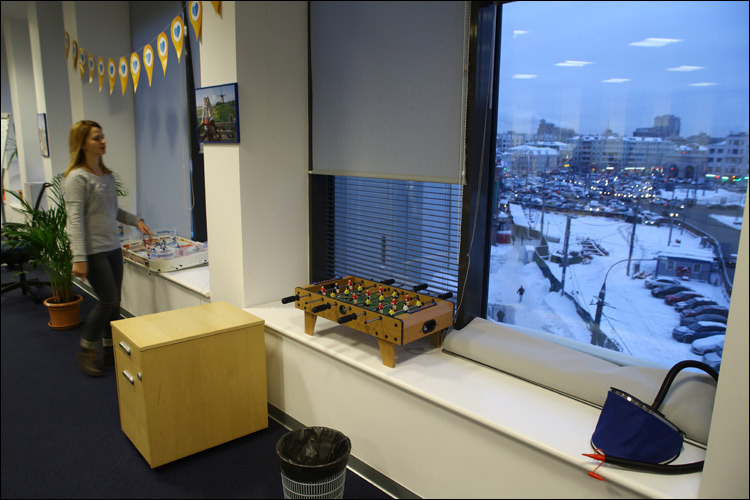
But again to the point. They showed one team (Russian), and then all this had to be explained in English, which became a separate quest. Sometimes it was simple, and sometimes you need to do a translation of the translation to make it clearer. I just vomited the tower from the simultaneous analysis of Russian and English: I understand why the translators sometimes “blur” their eyes. We discussed various things on video communication for almost three hours. Here are some examples:
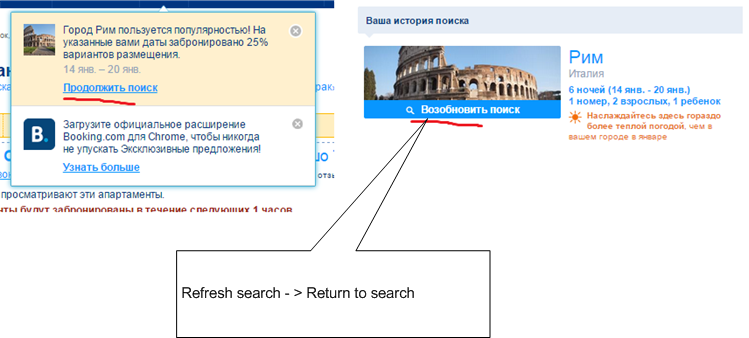



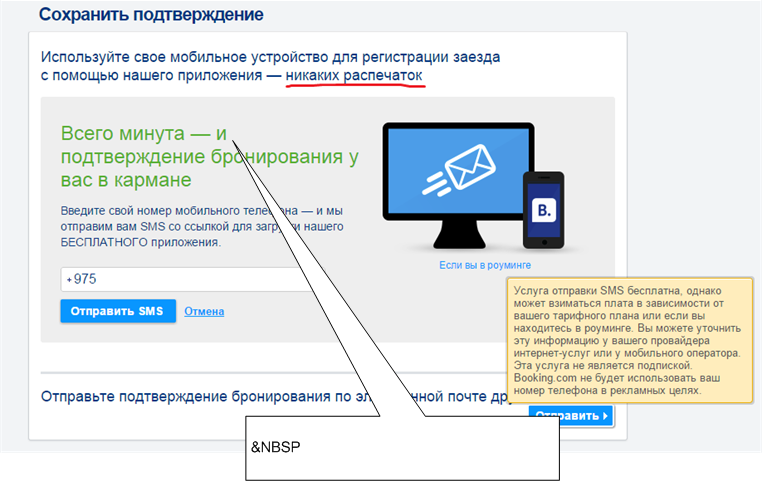

By the way, it turned out that they in Europe do not perceive the bracket as an emoticon. It is necessary to draw eyes with a colon, otherwise it is just some piece of punctuation.

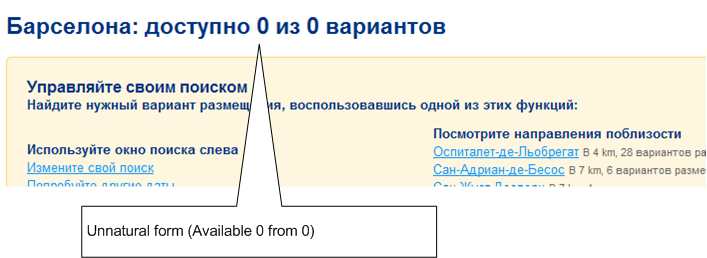

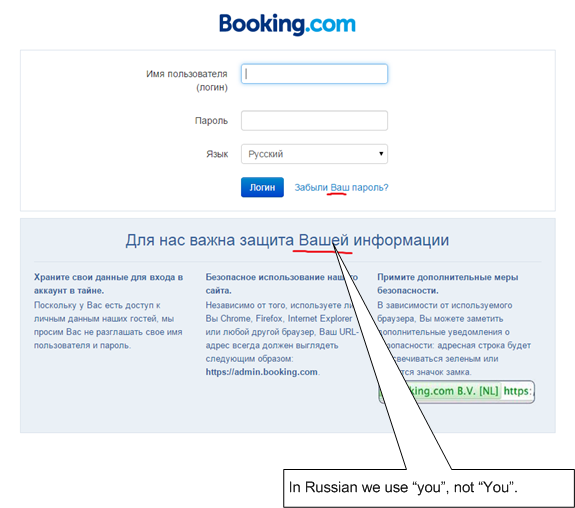
As a result, several hundred such places were accumulated. Basically, of course, typical problems - declination, numerals (1851 hotels found). It happens that somewhere a translator once translated the name of a button, and after a couple of years, someone, seeing the same English word, decided not to pull it again and used the variable elsewhere. And in the new context, the meaning has become completely different. Somewhere there were just difficult places - with all the enormous wealth of the Russian language, English is a little more flexible specifically in business terminology.
The most important thing in localization is not to translate verbatim, but to translate for sure. Remember, I was telling a theory regarding the translation of all incoming information into an internal dialogue? Here the principle is the same: if there is an advantage, it must be conveyed so that a person understands the first time. Compare:
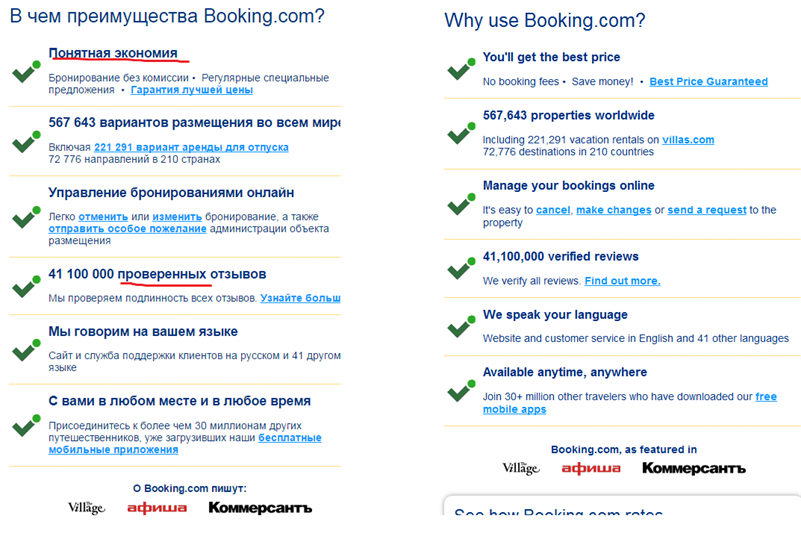
Here is the most interesting part. You need to understand what is most important to a Russian person from booking. Actually, obscenities and in rhyme managed to formulate everything at once in two lines. But at the disclosure of this formula, it turned out approximately the following:
1.In general, we do not need savings as abstract “savings”. We need to know one simple thing: that "Less than I paid, no one will ever pay for this room in this hotel." Or even so: peace is born by the fact that any other guest pays more or the same. And the specific guarantee is this: if the hotel gives someone at least once a lower price than at Booking, it will fly out of the base. Simple psychology. To understand this, you need to put yourself in the place of the user: it is unlikely that he compares prices for hotels, he just wants to get an honest price where he was staying. And he can only compare with other guests.
2.Booking shakes money from the hotel for accommodation, not from the client. When paying by card in the chain there is no counterparty who takes a couple of percent. The second for a European is taken for granted, and for the first they use the phrase “No booking fee”. I suggested something like: “No commission. No hidden fees. ” In general, the company that can write this on the main one without asterisks is happy. For example - the same AWAD takes money for an air ticket with a fee-based commission "for card transfers". It may sound wild somewhere in Germany, but the absence of hidden fees is a competitive advantage.
3.An important advantage of booking is the number of hotels in the database. The problem is that they show them in numbers, and this is not very logical to do. The fact is that it is simply impossible to compare their numbers and the numbers of other sites with hotels. Also a simple feature of the cognitive apparatus. People generally do not know how to compare numbers more than three-digit, if they do not remember them on purpose. It is necessary to explain that the hotels on this site right here are most of all in general.

4. In fact, the item about “most hotels” is also abstract. It can and should be finalized. A very specific important fact is that in the city where the user is traveling from Russia, there will be no hotel half the price across the road. All (or almost all) hotels are in the database, and a person will receive the best accommodation for their money.
5.Managing your online reservation is an item without specifics, because it is written from the point of view of the site owner. It must be disclosed from the point of view of the client. For example, you can cancel a number without a call and get all the money back if the flight is delayed. Or extend the placement while traveling on the train. At night, in the bathroom and under the rumble of a punch. Utility examples from small everyday stories - it is always very cool and very memorable.
6.The same goes for quick reservations. We are used to the fact that the hotel immediately confirms the settlement, but in Europe there is a tradition of calm answers in a day. Therefore, the site write "instant confirmation". But we have a much better phrase - "it takes only 2 minutes." It is good because Booking still did some cool work at the time to speed up all processes for customers, and all together will really take two minutes. Again, an example from the client’s point of view is “You can book a room 2 minutes before check-in.”
7.Another feature is bank cards. They are used in Europe as a means of authorization, so many hotels ask you for data, block the euro and give it back to get an ID. When you book without payment, these cards are still sometimes needed. And you can pay at the hotel during your stay at least in cash. Everywhere on the site in indications-sortings is the phrase "pay later." There is a problem with this - “later” can be “after 2 hours” and “at the end of the order process”. I suggested pay on the spot. These three words explain the whole concept.
8.You can brag a little somewhere. With a guest from Bucking, the hotel always rushes about like a written bag, because no one needs a negative review or a call from the office for the jamb. Naturally, this cannot be written on behalf of the company, but it can be indirectly, for example, by raising one of the reviews up. By the way, while I was looking in the social networks for various mentions about the incomprehensibility of something on the site, I found a wonderful phrase of the well-known narrower blogger Zyalt that you are king with their armor. Right here in the frame and on the main.
9.Well and the last - “We speak your language, we have support in 41 languages ...”. I do not care. 41 languages - well, cool, but not about me. Only one is important to me. I call - and the operator speaks Russian. Even if I’m stuck on an island from which I just sailed off a ferry whose captain, a bad person, lives for an approximate time of plus or minus ten minutes. I then tried to talk to the dude from the hotel providing the shuttle service. Either he did not understand English, or he quickly glanced through what exactly happened and squinted under the fool. I found a boat, but the sediment remained. So, the phrase should be about the fact that the Russian operator will answer you both in central Africa and the North Pole. If they build at least one hotel there.
In practice, until I started picking the translation, all these moments were completely irreplaceable in the normal use of the site. Seriously, I didn’t even think that something was wrong with the translation.
The fact is that such "robotic" texts are, in fact, the de facto standard in Runet. Look, here the original Russian site of Aeroexpress meets us with uncharacteristic capital letters and strange punctuation in the first form:
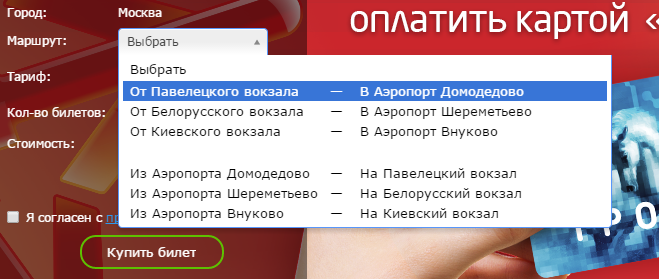
And here is the registration form on the main Facebook, also the same problems of translation and terms:

Here is a completely accidental site of a regional theater that has an English version not even planned. Also greetings from the robot in the dates:
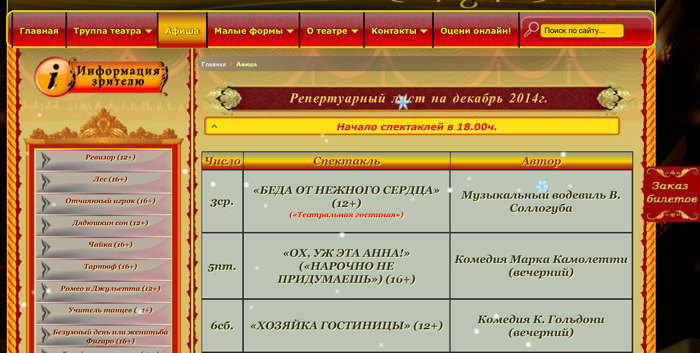
At the same time, evaluate JS-snowflakes in 2014-2015
And, by the way, the last is the mystery of the Rusia plate in the doorway. This, it turns out, is the name of a legal entity, and not a cunning designation of Russian representation. I suggested writing “Russian office” from above.
He showed the team a huge number of points where you can write better. First, he explained this to all Russians (not quite politically correct - part of the team from Amsterdam shuddered nervously in places), then a little more polite and squeezed (Polina explained that there was no need to take a screenshot of the interest search in the spirit of "Germany, mass shootings") - an English group from a copywriter , developer and marketing representatives.
I poked around the internal rules of the translation and suggested adding a little (slashes, small letters in “you”, a minimum of abbreviations, and so on).
All of the above will be corrected slowly, thoughtfully and for a long time. Most likely due to their release and sprint system, but I'm not sure. As for “there is no error, but it’s possible better” - it will go to AB tests, of which the site is constantly spinning immeasurably.
Here the main problem with the address is fixed:

True, specifically this taxi driver still would not have found, because the hotel was not a "Vassaga", but a "Baccarat".
Here's the fix for “pay later”:

Polina writes that she recently corrected some of the problems with cases, but so far without a developer. For example, there was: Paris - is more popular among travelers from Russia for: Architecture, Cuisine , but it became: Paris - a popular destination among travelers from Russia who are interested in: architecture; the kitchen .
Yes, if you come across a glaring jamb, here is the feedback form:
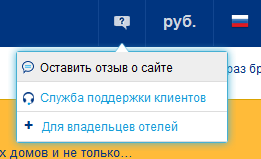
Everything about translations goes straight to the wonderful Polina Rybakova and the translation team, they are really watched (but rolled out for a long time). I must say that they really cheer for a good language there and constantly torment both developers, and English mouthguards, and marketing. Most likely, you will often come across what I have already noted, but which has not yet been fixed. But six months later, yes, it will make sense.
Moral: love Russian. It allows you to coolly convey the shades of meaning.
But I'm not talking about that. The fact is that Bucking offered me a contract to verify the adequacy of the translation of their site into Russian. I’ll show you right away how it started:

But what’s going on:

And now I’ll tell and show what and how with the interface texts.
What was it
The head of the Russian translation team, Polina Rybakova, contacted me and asked if I would like to dig their site for 5 days as an expert invited to the office. I did not have 5 days, and without thinking twice, I refused. Although, of course, I really wanted to work with these comrades, because there is something to learn. A week later, Polina contacted again and said that it could be shorter, the main thing is the result.
Then, the older Shi team from Shanghai called me and asked why I did not have a CV and LinkedIn profile. All applicants have, but I do not. The phrase about “I somehow do not need it, and then, I already refused you”, seems to have torn her template. As a result, we talked for about twenty minutes about the features of localization and a simple language. Shea requested various links to my publications, thought and signed a contract.
As a result, it was necessary to look through all the translations of the site and say:
- Where you can see that initially everything is written in English.
- Where can I do better for the Russians.
But enough lyrics. Go.
the main thing
Right on the main thing, this was striking:

The root of the issue in marketing. English has a beautiful word for any type of accommodation. It is needed because Bucking has not only hotels, but also all sorts of houses, and in general a lot of things. Including - rafts with apartments for rent. So, they categorically did not want to write “hotels” in this place, because the client must understand that everything can be booked in a row.
This is a classic fight marketing and interface. The phrase represents the entire site. And it was written so that nothing is deposited in the head. Plus, on the site, it is deep under the search form, which lists all the options. Both of these arguments compelled me to give advice after all to write “for hotel searches”. The principle is this:clear but incomplete information is better than completely incomprehensible and complete.
Now let's look at the big interface element of the main page - the search form. In the search - the power and might of

There are two important issues here:
- In the first block there is no clear distinction between price levels. In our country, unlike English, “budget” and “economy” mean roughly the same thing, and the difference between “deluxe” and “premium” is also set in the order in the list.
- In "Type of placement" it is not clear who and how is different. For example, I vaguely guess that apartments are apartments for the day, but I could not understand how the hotel differs from the bed and breakfast even from the third attempt. And still do not understand. It would be cool to pick out more accurate words and make tooltips explaining what it is.
Then another magic thing turned out. It turns out that variables (for example, city names) are stored without a genus. When they are substituted for buttons and other elements, you have to dodge, which gives rise to such monstrous constructions:

Here, by the way, there is another problem - two superlatives
Well or here:


Just change?Not really. Firstly, as with all normal client-oriented companies, no attempt to get in touch with a client is left without the warm breath of the central office. This is very correct, which is proved, for example, by the same Starbucks with an amazing school for training sellers and similar companies. A counterexample - it is worth letting it go by itself, and now the Russian branch of one automobile concern rivets an advertisement about sex (which is banned when it comes to the European director what happens); we have guys on the ground craving SMS with dubious text on the customer base and so on. In general - trash, waste and hell are possible.
It is clear that a company may receive something because of the inflexibility of such a policy when a person on the spot is smart and understanding. But in 40 countries, it’s easier to do everything from one place, and not to watch the self-expression of managers with interest. Here it means that all translations of important things marketing wants to see without distortion. Which, incidentally, is very sensible, again - in their place, I myself would have established such a rule. It was assumed that I would check from the side whether everything was accurately translated. In practice, it turned out that I convinced them that it was possible and necessary to step back a bit from mirror broadcasting.
Secondly, there is still complexity. As you can see from the cases, the translation does not end with those who write texts, and those who translate them into different languages. Need more developer, which will take into account the language features. In our case, there are long buttons, long fields of forms, declensions, kind of words, date format (December, 10) and much more. But such a task has so far arisen only in Russia. Translators said that only German is longer than Russian - but everything is simple there. The Germans quite calmly perceive English words in written speech and interfaces. As a result, developers may someday have to learn to persuade unfamiliar cities. And, most likely, with the help of Yandex language tools. By the way, for comparison: the same Facebook still can not cases - in my account flaunts "Lives in Moscow." Or, MS also missed a bit with texts for buttons and forms (see review):

Let's go further
I will just attach a few small pieces from the report to show what problems might be.
Here, the euro jumped to 80 rubles and went down to 70. This advantage has become very important:

Here you need more specifics. And at the same time - to hell with all the variables ("we speak your language" - well, let's call it!)

And again:

In the end, I suggested replacing the "account" with "your profile" or "your personal account" - the site uses a lot people far from IT, so you need to make life easier for them without scaring them with unfamiliar words.
And here, let me introduce, perhaps, the most important interface problem:

The fact is that the address is written in part in the original language (where the non-translated toponyms are), and partially in Russian (where the toponyms are translated). I tried twice to show the address to the taxi driver in the country with the hotel. He muttered into the Cyrillic alphabet and called the number from a piece of paper. Once again, I copied German addresses to Google maps to understand where the hotel is located - and smart Google got two very similar names on address translation to normal form. As a result, I almost stopped 70 kilometers east of what I wanted.
Recommendation - two addresses; one in the local language and one in Russian.
Here is another interface problem. The site has lists of hotels that act as favorites or bookmarks.

What is a “list” is completely incomprehensible. And these are the "favorites." If this is not possible, then you need to add the possessive “save to my list” or change the description of the process “add to the list”, “save these options in the list” to the description of the result like “remember the hotel”.
Various revealing trifles:



Booking produces cool city guides, which are written in a language much less official than on the site. If you even insert the word “residents” into this phrase, there will be what the English compiler wanted to say.

Here is the problem that the same variable can be taken from different places:

And here is the classic:

Here, apparently, in the localization there was something like% compare_caption%; on hover -% compare_description%. I suspect that the second tag for output was made copy-paste from the first, and we have two% compare_caption%. By the way, I think that in Russian it’s better not to “compare”, but “add to comparison” - they will run AB tests to get evidence.
Let's move on:


Here it’s very touching for the user to learn to click on the checkboxes. If you have to explain how the interface works in a tooltip, it means that the interface itself needs to be changed, not the text for it:

There are funny moments because of 12 times in English:

Here is a bit of localization: in enlightened Europe they don’t know about inter-regional roaming:

Office and teams
When the edits accumulated under a hundred, and some sort of systematics appeared, it was necessary to discuss all this with the rest of the translation team. And she, a surprise, is sitting in Amsterdam. Well, we picked it up and called: I first appreciated why videoconferencing is better than regular instant messengers, it was really useful. In general, the office has a very well-thought-out infrastructure, we must take it for ourselves to the future. Here, see, for example, a standard hatch in the floor:

“Spine” with wires:

All employees have the same laptops, and on all desks (including in the meeting rooms) the same docking stations:

I brought the laptop to the workplace, stuck it in the dock - I got a picture on the big screen and keyboard. He pulled it out with a crunch, went into the meeting room, stuck in the dock ...

A good indication of the busyness of the meeting rooms :

Some kind of Norwegian-German order, all the cabinets in the kitchen are neatly signed:

And our games are:

But again to the point. They showed one team (Russian), and then all this had to be explained in English, which became a separate quest. Sometimes it was simple, and sometimes you need to do a translation of the translation to make it clearer. I just vomited the tower from the simultaneous analysis of Russian and English: I understand why the translators sometimes “blur” their eyes. We discussed various things on video communication for almost three hours. Here are some examples:






By the way, it turned out that they in Europe do not perceive the bracket as an emoticon. It is necessary to draw eyes with a colon, otherwise it is just some piece of punctuation.




As a result, several hundred such places were accumulated. Basically, of course, typical problems - declination, numerals (1851 hotels found). It happens that somewhere a translator once translated the name of a button, and after a couple of years, someone, seeing the same English word, decided not to pull it again and used the variable elsewhere. And in the new context, the meaning has become completely different. Somewhere there were just difficult places - with all the enormous wealth of the Russian language, English is a little more flexible specifically in business terminology.
The most important thing
The most important thing in localization is not to translate verbatim, but to translate for sure. Remember, I was telling a theory regarding the translation of all incoming information into an internal dialogue? Here the principle is the same: if there is an advantage, it must be conveyed so that a person understands the first time. Compare:

Here is the most interesting part. You need to understand what is most important to a Russian person from booking. Actually, obscenities and in rhyme managed to formulate everything at once in two lines. But at the disclosure of this formula, it turned out approximately the following:
1.In general, we do not need savings as abstract “savings”. We need to know one simple thing: that "Less than I paid, no one will ever pay for this room in this hotel." Or even so: peace is born by the fact that any other guest pays more or the same. And the specific guarantee is this: if the hotel gives someone at least once a lower price than at Booking, it will fly out of the base. Simple psychology. To understand this, you need to put yourself in the place of the user: it is unlikely that he compares prices for hotels, he just wants to get an honest price where he was staying. And he can only compare with other guests.
2.Booking shakes money from the hotel for accommodation, not from the client. When paying by card in the chain there is no counterparty who takes a couple of percent. The second for a European is taken for granted, and for the first they use the phrase “No booking fee”. I suggested something like: “No commission. No hidden fees. ” In general, the company that can write this on the main one without asterisks is happy. For example - the same AWAD takes money for an air ticket with a fee-based commission "for card transfers". It may sound wild somewhere in Germany, but the absence of hidden fees is a competitive advantage.
3.An important advantage of booking is the number of hotels in the database. The problem is that they show them in numbers, and this is not very logical to do. The fact is that it is simply impossible to compare their numbers and the numbers of other sites with hotels. Also a simple feature of the cognitive apparatus. People generally do not know how to compare numbers more than three-digit, if they do not remember them on purpose. It is necessary to explain that the hotels on this site right here are most of all in general.

4. In fact, the item about “most hotels” is also abstract. It can and should be finalized. A very specific important fact is that in the city where the user is traveling from Russia, there will be no hotel half the price across the road. All (or almost all) hotels are in the database, and a person will receive the best accommodation for their money.
5.Managing your online reservation is an item without specifics, because it is written from the point of view of the site owner. It must be disclosed from the point of view of the client. For example, you can cancel a number without a call and get all the money back if the flight is delayed. Or extend the placement while traveling on the train. At night, in the bathroom and under the rumble of a punch. Utility examples from small everyday stories - it is always very cool and very memorable.
6.The same goes for quick reservations. We are used to the fact that the hotel immediately confirms the settlement, but in Europe there is a tradition of calm answers in a day. Therefore, the site write "instant confirmation". But we have a much better phrase - "it takes only 2 minutes." It is good because Booking still did some cool work at the time to speed up all processes for customers, and all together will really take two minutes. Again, an example from the client’s point of view is “You can book a room 2 minutes before check-in.”
7.Another feature is bank cards. They are used in Europe as a means of authorization, so many hotels ask you for data, block the euro and give it back to get an ID. When you book without payment, these cards are still sometimes needed. And you can pay at the hotel during your stay at least in cash. Everywhere on the site in indications-sortings is the phrase "pay later." There is a problem with this - “later” can be “after 2 hours” and “at the end of the order process”. I suggested pay on the spot. These three words explain the whole concept.
8.You can brag a little somewhere. With a guest from Bucking, the hotel always rushes about like a written bag, because no one needs a negative review or a call from the office for the jamb. Naturally, this cannot be written on behalf of the company, but it can be indirectly, for example, by raising one of the reviews up. By the way, while I was looking in the social networks for various mentions about the incomprehensibility of something on the site, I found a wonderful phrase of the well-known narrower blogger Zyalt that you are king with their armor. Right here in the frame and on the main.
9.Well and the last - “We speak your language, we have support in 41 languages ...”. I do not care. 41 languages - well, cool, but not about me. Only one is important to me. I call - and the operator speaks Russian. Even if I’m stuck on an island from which I just sailed off a ferry whose captain, a bad person, lives for an approximate time of plus or minus ten minutes. I then tried to talk to the dude from the hotel providing the shuttle service. Either he did not understand English, or he quickly glanced through what exactly happened and squinted under the fool. I found a boat, but the sediment remained. So, the phrase should be about the fact that the Russian operator will answer you both in central Africa and the North Pole. If they build at least one hotel there.
Why is all this imperceptible
In practice, until I started picking the translation, all these moments were completely irreplaceable in the normal use of the site. Seriously, I didn’t even think that something was wrong with the translation.
The fact is that such "robotic" texts are, in fact, the de facto standard in Runet. Look, here the original Russian site of Aeroexpress meets us with uncharacteristic capital letters and strange punctuation in the first form:

And here is the registration form on the main Facebook, also the same problems of translation and terms:

Here is a completely accidental site of a regional theater that has an English version not even planned. Also greetings from the robot in the dates:

At the same time, evaluate JS-snowflakes in 2014-2015
And, by the way, the last is the mystery of the Rusia plate in the doorway. This, it turns out, is the name of a legal entity, and not a cunning designation of Russian representation. I suggested writing “Russian office” from above.
How did it end?
He showed the team a huge number of points where you can write better. First, he explained this to all Russians (not quite politically correct - part of the team from Amsterdam shuddered nervously in places), then a little more polite and squeezed (Polina explained that there was no need to take a screenshot of the interest search in the spirit of "Germany, mass shootings") - an English group from a copywriter , developer and marketing representatives.
I poked around the internal rules of the translation and suggested adding a little (slashes, small letters in “you”, a minimum of abbreviations, and so on).
All of the above will be corrected slowly, thoughtfully and for a long time. Most likely due to their release and sprint system, but I'm not sure. As for “there is no error, but it’s possible better” - it will go to AB tests, of which the site is constantly spinning immeasurably.
Here the main problem with the address is fixed:

True, specifically this taxi driver still would not have found, because the hotel was not a "Vassaga", but a "Baccarat".
Here's the fix for “pay later”:

Polina writes that she recently corrected some of the problems with cases, but so far without a developer. For example, there was: Paris - is more popular among travelers from Russia for: Architecture, Cuisine , but it became: Paris - a popular destination among travelers from Russia who are interested in: architecture; the kitchen .
Yes, if you come across a glaring jamb, here is the feedback form:

Everything about translations goes straight to the wonderful Polina Rybakova and the translation team, they are really watched (but rolled out for a long time). I must say that they really cheer for a good language there and constantly torment both developers, and English mouthguards, and marketing. Most likely, you will often come across what I have already noted, but which has not yet been fixed. But six months later, yes, it will make sense.
Moral: love Russian. It allows you to coolly convey the shades of meaning.
